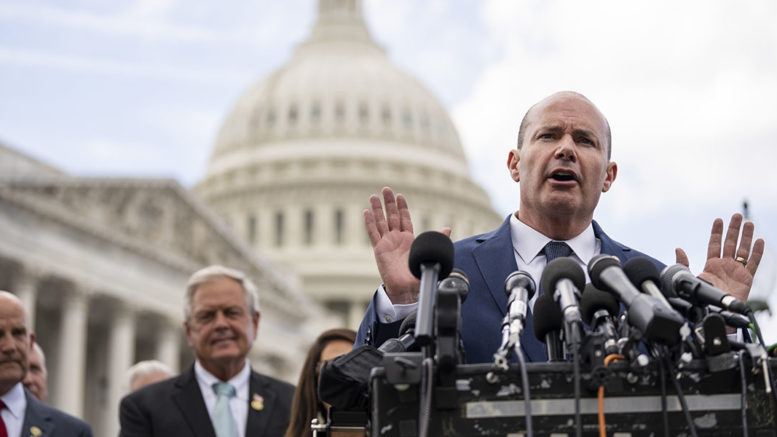Another year, another “government shutdown” fight on Capitol Hill.
As of this writing, 12 appropriations bills need to pass by Sept. 30 or the government will “shut down.” This means that some workers will be furloughed and most agencies will close temporarily.
We had a similar situation last December and the result was a rather pathetic cave by Republican leadership during a lame-duck session and nearly $2 trillion in spending for fiscal year 2023.
This year’s numbers likely will be similar.
The House Freedom Caucus, whose members are conservative Republicans, has vowed to oppose additional spending that leads to more inflation and debt, especially if the federal government continues to let the border crisis burn out of control with no end in sight.
We desperately need to get this problem under control for this country’s future.
At this moment it’s important to take a step back and consider why we seem to end up in these situations all the time. Why is government spending never under control? Why are we always being threatened with a government shutdown and the end of the world?
Sen. Mike Lee, R-Utah, had an excellent explanation in a lengthy thread Thursday night on X, the social media platform formerly known as Twitter. The crisis, Lee explains, has been concocted by leadership in both parties to maintain high federal spending and suppress individual legislative input.
In his thread, the Utah Republican says party leadership—what he calls the “law firm” (or “The Firm”) of Senate Majority Leader Chuck Schumer, D-N.Y., Senate Minority Leader Mitch McConnell, R-Ky., House Speaker Kevin McCarthy, R-Calif., and House Minority Leader Hakeem Jeffries, D-N.Y.—has caught on to the fact that voters and members of Congress don’t like massive, consolidated spending bills.
More on that in a bit.
Lee then writes about what omnibus spending packages entail and how the process has worked in recent years. Lee says a consolidated spending bill typically is written in secret with a few hand-selected appropriators on House and Senate committees.
Lawmakers then release the spending bill just a few days before a potential government “shutdown.” That way, there is little opportunity for debate and the spending legislation advances without substantial changes.
“At the same time, the fast (almost mindless) flurry of legislative action at the end of this legislative charade gives it the false appearance of democratic legitimacy,” Lee writes.
What’s important to note is that the dividing lines on spending bills aren’t necessarily partisan. This is the “uniparty” phenomenon where leadership on both sides of the aisle basically swims in the same direction.
There tends to be more resistance to this phenomenon among Republicans, Lee says, for two reasons: “(1) government spending inexorably grows, and (2) the spending bills advanced by The Firm tend to unite Democrats while sharply dividing Republicans, producing a net gain for Democrats.”
Republican appropriators, Lee writes, generally favor their spending priorities over policy victories, which keeps leadership happy.
Because of the extremely short timeline on these massive spending bills and the threat of a government shutdown, Lee writes, rank-and-file lawmakers typically are browbeaten into voting “yes.”
Anyone who has followed government shutdown fights over the years knows it’s an iron law of the universe that corporate media narratives always revolve around blaming Republican opponents of runaway spending for a shutdown, rather than the big spenders themselves.
This reality is usually enough to corral members to submit and sign off on the spending, objections or not.
The result of all this is that lobbyists and special interests often have more power than legislators in the spending process because they have the ears of appropriators and The Firm, as Lee calls Senate and House leadership.
“It’s terrible for the American people, who are stuck with the horrible consequences of this shameful dance, including rampant inflation and our $33 trillion national debt,” Lee writes.
Importantly, Lee writes that he doesn’t necessarily have an issue with an omnibus spending bill in general. Where he has a problem is with the secretive, rushed process in Congress that makes genuine deliberation impossible.
Lately, the opposition to these tactics has become more intense as members and voters have caught on to the game. The Firm’s process is evolving to create the illusion that congressional leaders actually oppose the omnibus approach, Lee writes.
“That illusion disappears when, on closer inspection, it becomes evident that The Firm’s new strategy is to promise to pass two or three smaller omnibus measures (sometimes called “minibus” bills) by essentially the same, rigged process long associated with the omnibus,” the Utah Republican writes.
Of the 12 spending bills Congress is working on, only the “MilConVA” to fund military-related construction through the Department of Veterans Affairs has passed through the House. But the bill was consolidated into a “minibus” by The Firm, Lee writes in his thread, with two other spending bills from Democrat-controlled Senate committees.
This move essentially played right into the hands of congressional Democrats and would give them leverage in end- of-the-year spending fights. The minibus plan was scuppered only after a few Republican senators objected and stood their ground.
What Lee is getting at here is one of the essential issues with American governance: We desperately need Congress to act like the deliberative body it was created to be, or the idea of self-government at the national level is little more than a farce.
Have an opinion about this article? To sound off, please email letters@DailySignal.com and we’ll consider publishing your edited remarks in our regular “We Hear You” feature. Remember to include the url or headline of the article plus your name and town and/or state.
Original source
#Sen #Mike #Lee #Explains #Congress #Broken

